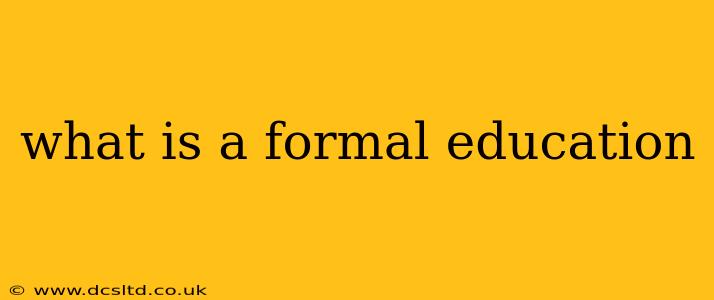Formal education, in its simplest form, is a structured and systematic process of learning that takes place in a designated institution, typically overseen by qualified educators. It’s characterized by a curriculum, assessments, and the awarding of credentials upon successful completion. Unlike informal learning, which happens organically through experience and daily life, formal education offers a deliberate and organized approach to acquiring knowledge and skills. This structured environment helps individuals develop a wide range of competencies, impacting both their personal and professional lives.
What are the Different Levels of Formal Education?
Formal education typically encompasses several distinct levels, each building upon the preceding one:
-
Early Childhood Education (ECE): This stage focuses on foundational skills like language development, social interaction, and basic cognitive abilities. It often involves preschool and kindergarten programs.
-
Primary Education (Elementary School): Here, children receive a broader education covering fundamental subjects like reading, writing, arithmetic, and science. This level lays the groundwork for future learning.
-
Secondary Education (Middle and High School): This stage expands the curriculum to include more specialized subjects, preparing students for higher education or vocational training. It often includes electives allowing students to explore their interests.
-
Higher Education (College and University): This involves advanced study in specific disciplines, leading to undergraduate and postgraduate degrees. It’s designed to cultivate critical thinking, specialized knowledge, and research skills.
-
Vocational Training and Apprenticeships: These programs provide specialized training for specific careers, often involving hands-on experience and on-the-job learning alongside classroom instruction.
What are the Benefits of Formal Education?
The advantages of pursuing formal education are numerous and impactful:
-
Enhanced Earning Potential: Individuals with higher levels of education generally earn more throughout their careers. The skills and knowledge acquired translate to higher-paying jobs and increased opportunities for advancement.
-
Improved Employment Prospects: A formal education significantly improves job prospects, particularly in competitive fields. Employers often prioritize candidates with relevant qualifications and experience gained through structured learning.
-
Personal Growth and Development: Formal education fosters critical thinking, problem-solving, and communication skills – all vital for personal and professional success. It broadens perspectives and enhances self-awareness.
-
Increased Social Mobility: Education acts as a powerful tool for social mobility, enabling individuals to transcend socioeconomic barriers and achieve upward economic advancement.
-
Access to a Wider Range of Opportunities: A formal education opens doors to a greater variety of career paths, further education, and personal enrichment opportunities.
How Does Formal Education Differ from Informal Education?
While both are essential for personal development, formal and informal education differ significantly in their structure and approach:
-
Structure: Formal education is highly structured, with predetermined curricula, assessments, and schedules, while informal learning is unstructured and self-directed.
-
Setting: Formal education takes place in dedicated institutions, while informal learning happens in various settings, including homes, workplaces, and communities.
-
Assessment: Formal education includes formal assessments like exams and projects, while informal learning doesn't typically involve formal evaluations.
What is the Importance of a Formal Education in Today's World?
In today's rapidly evolving world, formal education is more crucial than ever. The increasing complexity of the global economy and the rise of technology demand a skilled and adaptable workforce. Formal education equips individuals with the necessary knowledge, skills, and adaptability to thrive in this dynamic landscape. Furthermore, it fosters critical thinking and problem-solving abilities essential for navigating the challenges and opportunities of the modern world.
What are the Different Types of Formal Education Institutions?
Formal education is delivered through a variety of institutions, including:
-
Public Schools: These are government-funded institutions that provide education free of charge (or at a low cost).
-
Private Schools: These are independently funded schools that often charge tuition fees. They may have a specific religious affiliation or educational philosophy.
-
Colleges and Universities: These institutions provide higher education leading to undergraduate and postgraduate degrees.
-
Vocational Schools and Training Centers: These institutions offer specialized training for specific careers.
This comprehensive overview provides a clear understanding of formal education, its various aspects, and its crucial role in individual and societal development. By understanding the benefits and structures involved, individuals can make informed decisions about their educational journey and leverage the opportunities it provides.
